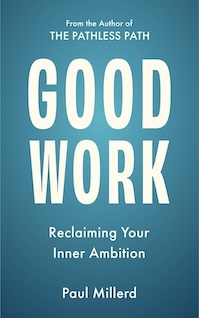
“Good Work” is Paul Millerd’s second book, following Pathless Path, which I read last year during my sabbatical. In this new book, he shares his journey from being a strategy consultant to becoming a writer and creating a life centered around work he truly enjoys.
He mentions how he was job hopping over the years, searching for the perfect job and never feeling fully satisfied. His realization is:
At a minimum, you must relinquish your job-based mindset and the belief that a job can deliver everything you desire out of life.
He talks about how visiting Taiwan helped him to get some distancing from the people and culture he grew up in and the scripts he was holding onto:
Even after quitting my job and having far more freedom, I felt out of sync with the culture and energy of the U.S.
Paul talks about energy and a sense of aliveness on his current path, and you can tell when you watch him on Youtube.
He classifies work into different types:
- Good Work: (for him writing)
- Supporting Activities: (for him podcasting, reading, conversations)
- Good Enough Work: enables you to do things you enjoy, doesn’t drain your energy (his StrategyU online course)
- Bad Work: drains your energy (for him freelance consulting)
Here are some quotes from the book:
Critique of Traditional Work Identity
- We internalize the message of what Byung-Chul Han has called the “achievement society” where the primary goal of a life is to constantly improve, nudged to become “entrepreneurs of [our] selves.”
- The scripts were powerful. They told me that “work” and “a job” are the same thing and that work is the center of life. They convinced me that no breaks were allowed: you must work non-stop from graduation to retirement.
- The people most afraid to leave their jobs are well-compensated, Type A achievers. They are constrained by their assumptions that life revolves around continuous employment and a steady career trajectory.
Rediscovering Self:
- I spent several years critiquing the corporate world from within, convinced I could help “fix” it. But really, this was an elaborate way of deflecting blame onto the “system” rather than taking responsibility for my own life. Simply, I was terrified to admit that I did not fit into this world I had worked so hard to enter, and I was scared to find my own way out.
- After I quit my job and stopped trying to do things I didn’t enjoy, I discovered a massive reserve of energy.
- The small village of Canggu in Bali was the perfect place to experience this confusing situation, as I was surrounded by many others trying to reinvent themselves too.
- I had found a connection to myself through writing, and with my awareness of that shift, I craved a new vision for life centered around aliveness.
Desire for a Life of Freedom and Authenticity:
- Once I stopped trying to be successful in other people’s eyes, I was able to slow down, pay attention, and notice the things I did naturally, like writing.
- Leaving money on the table is easy for me because I am no longer willing to leave soul or peace of mind on the table.
- I’m just having fun exploring ideas and seeing where they take me.
Path to Good Work
- One of the hardest challenges I faced early on was that the work I had the most confidence in and my best way of making money, freelance consulting projects, was very clearly not my good work.
- The right approach is to treat the work that feels good as sacred, protecting it as long as possible by making money doing something else.
Reimagining Work
- Instead of optimizing your time, you optimize your energy and pay attention to how you feel over time.
- Writing doesn’t deplete me and usually even gives me energy. I don’t have to push to complete it and instead, I am pulled forward. In my last job, it was as if I was carrying a 50 pound backpack filled with sand through my days.
Questions for finding your “Good Work”:
- When was the last time you felt like you were fully alive and connected to work of any kind?
- What did you do as a child that you loved?
- How much would I pay to work on this?
I thought the book was really good in conveying emotions and expressing how he felt throughout the journey: “filled me with wonder”, “noticed this aliveness”, “was energized by”, “I began trusting”, “I deepened into this slowness”, “I felt more connected to myself than ever”, “It was so simple, but it felt so good”, “It felt right”.
A question that resonated with me was: “What was the point of quitting if I was just going to recreate my former life?”
The idea of framing good work around feeling alive was powerful and gave me a fresh perspective. Overall, it was an enjoyable read on a topic I deeply care about.
